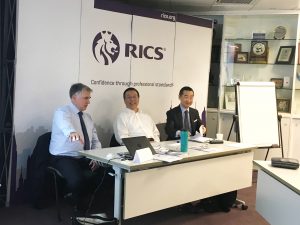With its primary function to set standards across the property and construction sectors and to regulate the conduct of over 200,000 members around the world, RICS is celebrating its 150th anniversary this year. Sitting within RICS is the Dispute Resolution Service (DRS) which for the past 42 years -has been appointing arbitrators, adjudicators, and experts across the built environment.
John Fletcher
 “Over the past decade we have redefined ourselves as a global organisation. Today we make over 6000 appointments per year around the world and probably deal with about 2 billion US dollars’ worth of disputes which are the subject of those appointments. We are internationally the largest built environment-specific dispute resolution service provider,” explains John Fletcher, RICS ADR Product Group Director.
“Over the past decade we have redefined ourselves as a global organisation. Today we make over 6000 appointments per year around the world and probably deal with about 2 billion US dollars’ worth of disputes which are the subject of those appointments. We are internationally the largest built environment-specific dispute resolution service provider,” explains John Fletcher, RICS ADR Product Group Director.
“Generally, what distinguishes us as a dispute resolution service provider is that the vast majority of people we appoint, although some of them are solicitors and barristers, are drawn from the surveying profession. We specialise in appointing professional sector specialists to deal with disputes that lie within their area of professional specialism, and whom we have also trained up as mediators. Our approach is quite different to most dispute resolution service providers who are very lawyer heavy,” he adds.
RICS describes its ACRE Mediation (an acronym for Analytical Commercial Restorative Expert) as a robust, bespoke built environment focused mediation service. As such, it is designed to assist delegates to build negotiation skills and provides the opportunity to practice management of disputing parties, and to appreciate and anticipate the complexities, pitfalls and opportunities of mediation. The basic facilitative training consists of two separate modules held over five full days. Delegates also have the option of participating in a third module in evaluative mediation, consisting of two full days training and practice.
“There is a central and fundamental distinction between expressing an opinion, which is what an evaluative mediator does, as opposed to a facilitative mediator who never expresses an opinion. If you are expressing an opinion, the view that we take at RICS is that is legitimate, so long as you are expressing an opinion to empower the parties to make a good decision about how to settle the matter. If you are expressing an opinion to replace the parties engaging with the dispute then it is not legitimate and this is the fundamental point that underpins the whole ACRE mediation approach,” explains Fletcher.
In terms of Hong Kong, where RICS have been offering mediation services for decade number of years, ACRE mediation is particularly exciting given that this is the first time that an approach to mediation that includes specifically evaluative tecniques is being presented in the Hong Kong market.

For Fletcher, there is a real opening for a combination of facilitative and evaluative mediation to be applied: “ACRE is a natural progression from RICS’ historical involvement in mediation. In Hong Kong, it is also particularly timely as it addresses the considerable concerns that organisations such as the Hong Kong Mediation Accreditation Association Limited (HKMAAL) are grappling with, at a time when the Hong Kong government is engaged in a formal consultation on the use of evaluative mediation in the city.”
Fletcher also makes the point that whilst the ACRE mediation course was rolled out in the city in 2016, and traditionally targeted at senior members of the construction, land and real estate industries and members of government departments, many organisations within the built sector are investing money in their ‘rising stars’, typically identified as those in their 30s who have been with that organisation for ten years or so, who need and deserve to increase their skill base.
“As well as individuals who are reaching the end of their professional career, who are looking for something new to do where they can use their years of experience to benefit others, we are finding that young people are benefiting hugely by acquiring this skillset and set of insights which they can then take back and use in their day-to-day job. Ultimately many of them I will become practising leading mediators later on, but at the moment they are there to advise parties, to help parties prepare for mediation or just to use that skillset when dealing with contentious matters, whether or not those matters lead to mediation,” Fletcher concludes.
Winston Siu

“Mediation in Hong Kong started in the 80s: first for family mediation and then for general mediation,” states Winston Siu, Chairman g2g Mediation centre Ltd. “Mediation development here took a prudent approach, so therefore it did not move as quickly as say in China. Overall, it has been an effective means of alternative dispute resolution. It has helped parties in dispute to settle matters quickly and at lower costs verses litigation. My mediation experience in Hong Kong includesCommercial disputes, construction disputes, shareholder disputes, franchise disputes, workplace disputes, community disputes, lands tribunal cases, and family disputes. “
When considering current trends in mediation, locally and in the region, Siu notes that in Hong Kong, facilitative mediation has been the prevailing approach, with a growing preference for evaluative mediation because he says, disputing parties have expectations that mediators with expertise and specializations are capable of giving them points of views and non-binding opinions and options. He says mainland China has moved and grown rapidly in the past 5 years, and in many areas surpassed Hong Kong and there is no preference on mediation approaches in terms of facilitative mediation or evaluative mediation. The emphasis is on what approach the parties prefer and need. The first commercial dispute mediation centre for the Belt and Road Initiative was established at the Qianhai Court in Shenzhen about a month ago Siu notes, and adds that in Asia Pacific mediation has become very popular as an alternative dispute resolution.
What value do you see in a) facilitative mediation and b) evaluative mediation?
“I see facilitative mediation as the basis of which mediation is grounded on, like an undergraduate university degree, which can serve many people adequately. The benefits of facilitative mediation are that disputing parties can readily find mediators trained in the facilitative mediation model, so their disputes are resolved quickly, economically and without receiving views and proposals from the mediator.”
“Evaluative mediation is like a doctorate degree, required by disputing parties who are looking for specialists or experts, involving complicated, complex, and cases involving a great amount of money. An analogy will be as if a patient requires a medical specialist to deal with the disease which cannot be dealt with by a general practitioner. Disputing parties expect to obtain views and advice from the evaluative mediator. “
When asked if he sees any changes in Hong Kong government policy regarding mediation, Siu says that The Department of Justice has set up a working sub-group on evaluative mediation to look into how to develope evaluative mediation in Hong Kong. “I am looking forward to seeing the recommendations from this sub-group.”
What are the mediation opportunities you believe will be brought about through the One Belt One Road Project?
“So many countries are involved, and so many diverse projects will be initiated, planned and executed. There are bound to be many incidences that will require mediation as an efficient, fast, effective, relationship enhancing, maintaining, repairing means to deal with disputes. Opportunities will be abundant for evaluative mediation to deals with these highly complex, complicated, multifaceted, high value projects.”












